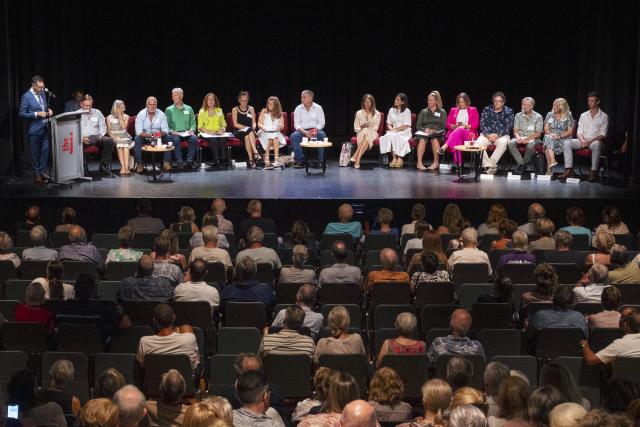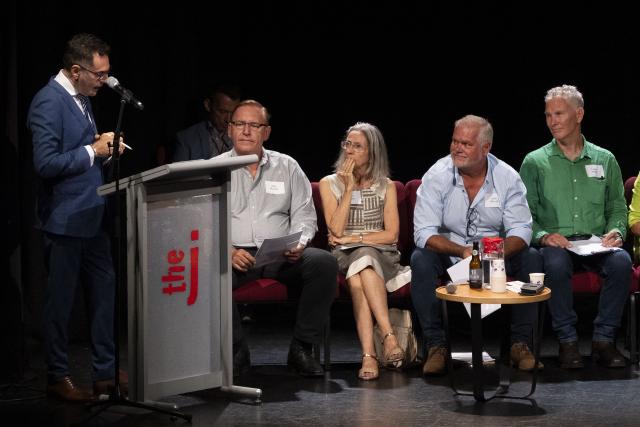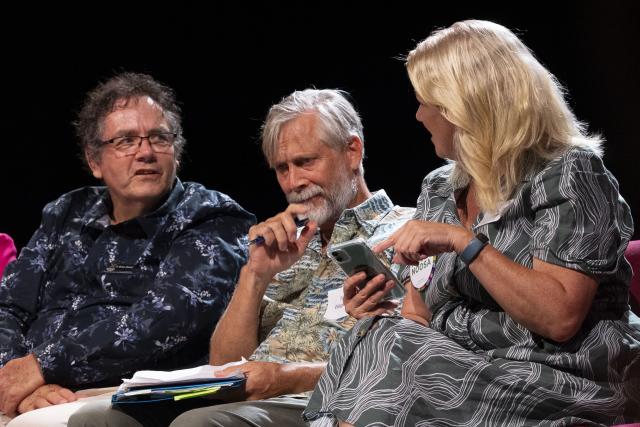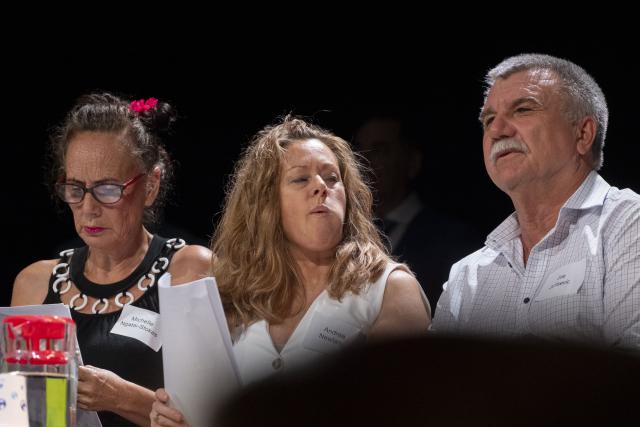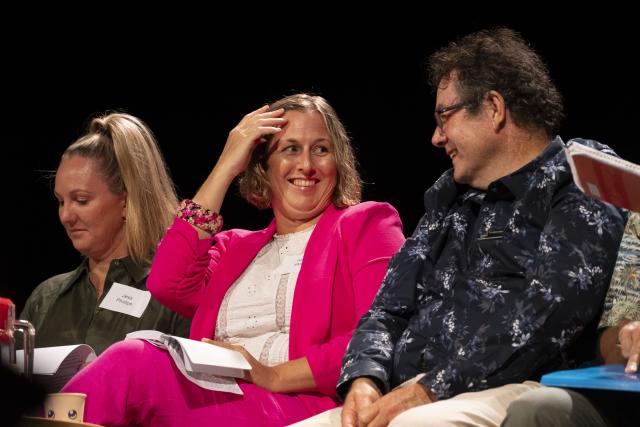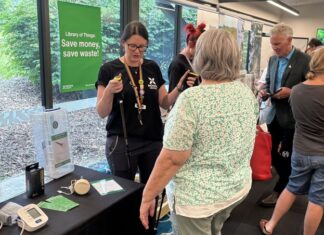In the lead up to the Noosa Council elections, Noosa Chamber of Commerce, Noosaville Business Association and the Hastings Street Association collaborated to provide a platform for council candidates.
The atmosphere at the J on 28 February, reflected the gravity and importance of this opportunity for both the candidates and the community.
Opening the event Tim Rook, vice-president Noosa Chamber of Commerce and Noosaville Business Association president, said it was important for voters to have the opportunity to engage with the candidates directly and understand their plans for Noosa’s future.
A respectful crowd filled the seats to near capacity, keen to hear from Mayoral Candidates Nick Hlusko, Ingrid Jackson, John Morrall and Frank Wilkie, followed by Councillor candidates Karen Finzel, Jess Phillips, Nicola Wilson, Andrea Newland, Brian Stockwell, Amelia Lorentson, Leigh McCready, Joe Juresevic, Mat Bankes, Michelle Ngatai-Stokes, Tom Wegener and Alecia Staines.
Mayoral candidates were given five minutes, and councillor candidates three minutes, to promote themselves, share their policies, and highlight their vision for the future of Noosa before each answered a question to test their due diligence in being across all areas of the Shire’s needs, selected randomly from a list of questions delivered by the Chamber to candidates two weeks earlier. Voters witnessed a variety of approaches and personalities on the stage, as candidates shared their values and priorities.
Chamber committee volunteers, along with MC John Caruso, ensured the event kept to intended timing. Clearly a well managed event, the attendees and candidates were respectful, audio standard excellent, and overall, the event deemed a great success.
Here are candidates’ answers to the Chamber’s questions, beginning with the four Mayoral candidates.
Question: The local government act clearly defines the responsibilities of elected members and the chief executive officer, with elected members responsible for setting the overall direction of the council including determining policy and other matters at strategic level and CEO responsible for day-to-day operations of council . Noosa Council currently has an acting CEO with a permanent CEO to be recruited after the election. What do you believe are the top three priorities a new CEO should be addressing?
Nick Hluszko – I could leave it as people, people, people. We need to get the house in order because without the full complement of people, the right people in the right jobs, nothing’s going to be very, very easy. In fact it’s going to be extremely difficult and more expensive.
My biggest concern is Council’s financials.
Nick quoted from a Noosa Matters article published nine months ago: “Why does council have a mountain of cash it doesn’t really need, while it keeps whacking ratepayers with total general rate increases above inflation.”
The fundamental question here is why does council keep raising rates when they know businesses and families have been badly affected in recent years, and are banking the money.
In 2020 there was $40m each year and its rising today to $106.8m, mid-year it’s about $140m.
Cash coverage should be three months, maximum six months, yet council has had 13 months cover for such a long time, even the audit office said this was excessive.
How is council’s financial management in any way consistent with their objective council operates in an efficient, effective manner minimising general rate increases.
There seems to be a very strong argument for me to impose a rate holiday.
How do we fix this?
We need to completely breakdown captics and optics of the budget, and work through what is important versus what is discretionary, only things of immediate importance should be budgeted for. It’s time for council to tighten its belt. Staffiing is number one.
We need to make sure we pay for staffing out of funds that already exist and not whack ratepayers any more money.
I want to see restricted cash reserves fully detailed and justified and use whatever’s not urgent to fund other initiatives.
Question: Noosa Council economic development strategy 2021-30 aims for diversified and resilient economy that delivers high value employment opportunities.The strategy is supported by a number of priority actions. What are top three priority actions in the plan you believe should be progressed and why?
Ingrid Jackson: I’m in favour of the whole economic development strategy and seeing it progressed, I’d like to see the economic development unit better resourced so they could do that.
In particular I’m interested in strategies that empower collaboration and shared initiatives as I believe council’s role should be where possible to enable business community.
I like the smart biosphere concept because UNESCO’s real intent for the biosphere is for people creating a thriving economy and community in harmony with nature. Previous councils have changed that to be more about the environment only and it’s meant to be about people and their businesses.
Three things I think are highlights and should be actioned in the strategy.
1. Bold economic leadership, that’s described in detail in the strategy, in particular integrated goals and cross sector strategy, working together across various areas, and building partnerships across private and public sectors and local government.
2. Empowering business ecosystems, I like approach in collaboration with stakeholders, establishing economy industry plan that supports ecosystem development and explores areas of competitive advantage and sector trends.
3. Enabling infrastructure – this is about the development of an innovation zone in Noosa business centre, Noosa Civic area, working with stakeholders, facilitating process to explore funding mechanisms, models and partnership oppportunities, part of this infrastructure work is about developing employment land, land that exists that is marked for employment that hasn’t been fully utilised for opportunities for jobs and incomes for our people.
Question: With a 2023-24 budget of $171m council is a major business with elected Mayor and councillors essentially taking on the role of board of directors. Outline what experience you have with managing large businesses and boards and setting strategic direction of a company.
John Morrall: With my level of management over the years I’ve dealt with boards in hospitality, boards in the retail industry, boards in the fitness industry. I’ve worked with many boards, some in Japan, I’ve worked a lot on budgeting, strategy, everything that a board requires is what I used to put together for the board. Have I sat on boards? I’ve sat on many boards over thee years, Noosa tigers a few years ago, I sat on their board helping them get to where they wanted to be. My versatility in my business and all I’ve done enables me to look at all facets of many businesses not just one, to sit ono a board and help me to work with all the councillors to take businesses to another level, I have an understanding of what the majority of our businesses are in this town. So working with boards for me I have no dramas with boards, happy to work with them again.
Question: Outline your biggest concern in relation to council’s finances and how you would go about addressing that if elected.
Frank Wilkie: One of the advantages of being in LG for long time you get to understand that the financial figures you are given mean different things to what you would understand them to mean if you were in a corporation.
For example, having $116m in cash in the bank is a good thing. It doesn’t mean it’s free cash, it means it’s there for a specific purpose. You cannot spend it on anything . A lot of it is constrained funding -that is, funding for levies, for capital works. The current budget sits at $310m. Now that’s extraordinary because you take into account $136m operations revenue and add that to $170m in external grant funding to do capital works and and disaster recover work.
So, in terms of funding availability, that’s not a problem for NC, in terms of cash expense cover which is only required to be three months. every time you have rates collected you get a spike in that, that figure come down as it gets used for operational expenses, gets down to three-six months, when rates are called again you get spike in funding, towards end of the financial year it ends up being what it’s meant to be.
I do have a concern about emergent costs on the council budget, one thing the audit office says we need to be better at is having an asset management plan, since de-amalgamation we did not inherit the list of the assets – the asset management plan, staff have had to start from scratch. they’ve decided to take a very diligent approach to it, They were compartmentalising all the assets. eg at The J every light fitting is considered an asset.
Are compiling all assets, what does occur, we’re still working through that process, especially with community halls, we are often hit with emergent costs that hadn’t been picked up in the asset plan, the better we get at asset management planning the best we can factor in these emergent costs and plan for them. So I’d have to say having a better asset management plan.
Question: Council has adopted various high level strategies and supporting plans that outline council’s short, medium and long term priorities and aspirations including economic development strategy, corporate plan, transport strategy. How would you ensure council delivers on actions of these strategies and plans?
Mat Bankes: First off, it’s going to be a team effort. How I would do it, is going to be how we will do it. How we would do it is undefined yet because any number of these people that I join will be a different unit in itself. Individually I’m going to approach it the way I approach it. If you’ve done your research you’ll know who I am and what I stand for and what I’m about. As each of these people are individuals as well.
Together what that unit looks like is going to mesh and be its own entity that will approach these things differently.
I’m going to be a team player, I’m going to work hard, I’m going to be out there in the public to get as much information, as much knowledge, as much contact with you guys as possible. I’ve got this image of a sieve of information that needs to come through our brains as councillors and mayor. We need to put that into one coherent dialogue of communication and into that space in the council.
It’s person who can take on the most amount of perspective with the most amount of compassion with biggest understanding from every point of view and angle that this council and shire is being looked at through your eyes
It’s our job the best way possible to communicate that into the circle and have that as a team to guide the decision making process, guide what we advocate for. I’m going to be in your face and in your ears as much as possible and get as much feedback from you as possible. And I’ll to do the same to them – be in their face and ears as well.
Question: Population growth and visitor capacity is a concern of some residents. Maintaining economic grow is a necessary consideration for many residents working in small businesses operating in the region. What are your thoughts on best way to balance economic growth with visitor numbers?
Nicola Wilson: This is really the million dollar question, population growth and visitor numbers. We have to do a lot of work to find the right balance. There’s no easy answer I can give you in two minutes. The economic development strategy looks at the concept of a smart biosphere. I’d like to understand that further.
Services are already struggling with population growth, and the effects of the fires, floods and landslides we’ve had. Any growth in visitor brings more pressure on those. Visitors also spend money in our local businesses, we like that.
We want businesses to thrive, of course, Those businesses need workers, they need somewhere to live, and transport to get to work. This is big lifecycle we need to solve. These are not new issues at all. There’s tons of council plans.
There are plans for everything, maybe too many to absorb in this short period over this election campaign. The Noosa plan does address this. The biggest thing in my opinion we need solutions for housing to support residents and local businesses and we need to transport to transport people, not just cars, but people, That way businesses may get more freed up to do what they need to do and not be struggling with traffic congestion and all the other issues we face.
Question: There’s a growng residents’ first sentiment from some members of the community. Do you believe council’s approach to tourism appropriate and, if not, name actions you would like to take to change that.
Tom Wegener: Residents first. We were talking about homeless people coming in , I asked head of department who is a resident, she said all the people here. We have to house all the homeless. Everyone who comes here is quickly a resident, we don’t have a good definition of a resident. we are all coming here, very few are born here very few from Kabi Kabi nation. when it comes to residents first we should look after them. Noosa is a very beautiful place to live, because of that it’s beautiful place to visit. I’m always focusing on making it the greatest place to live. We talk about the biosphere. We want to give this Noosa to the next generation better than we found it. To do that we need to maintain it.
First, I think Tourism Noosa has gone a bit rogue.
Second, we have planning scheme amendments coming before us, we can’t change the STAs through the planning scheme amendments. It’s all been confidential. They’ll going to come out to public consultation. Hopefully we can wind back the STAs.
Question: The recent Destination Management Plan discussion paper has identified eight priority areas of concerns and potential solution, how would you address these issues
Brian Stockwell: If we’d had this event four years ago who would have said we need a DMP? I did. For the first six months of this term I talked to the heads of Tourism Noosa, heads of environment groups, community groups.
We need to separate the body that manages the destination and the marketing of the destination. That’s how we got to the point of investing in the DMP. It’s all about doing what we need to do to avoid impacts of our success. It’s all about how we as a community want to invite people in to enjoy the things that attract us here to live. I don’t need to have a priority because the consultation come back and it was really clear what the community said, about 46 per cent said we want transformational change. We don’t want the status quo. What does that mean? In three years up to 2022 we had 100,000 extra day trippers and how much did they contribute, just 10 per cent of what domestic overnight visitors contribute. When we look at priorities we say what market segments do we want to attract and we market to them. We used to say value over volume, this DMP concept of regenerative tourism says values over volume. We want people to come here for the same reasons we want to live here.
Question: Transparency and accountability are crucial in local government. How do you plan to ensure transparency in decision making processes and make sure accountability and transparency to residents.
Alecia Staines: As far as transparency and accountability goes there’s various mechanisms. One thing I’d like to see is more co-design and not just consultation. We have various locked datasets within the website we could be transferring to more user-friendly information and publishing across social media. When motions are put forward and voted on I think there are easy ways we could be using social media instead of residents using YouTube. I speaking from a millennial perspective. I think there are a lot of residents on Facebook who would find this easy. Looking at what other jurisdictions do as well, interstate there’s been trials that have been recognised as best practise in transparency and accountability. It’s similar to what I’m talking about, making things very user-friendly in a platform or way it’s easy to understand and digest, and actually reduces the amount of closed door meetings, where we have some interface where residents could be seeing this sort of information as well.
Question: What are the top three actions arising from your election policies you intend to progress and how do you propose to fund them.
Jess Phillips: I’ve spoken about safety being my priority as far as our residents go, so the first thing I’d like to do is to look at CCTV upgrades in our area, especially in high volume places. Drawing on my experience I’d look at vulnerability in community. I do a lot of vulnerability assessments, or used to. I’d look at where our vulnerabilities are, where we’re unsafe, listen to the community. I got a lot of responses on social media on safety in amenities, waterways. I’d like that to be one of the priorities, advocate for safer amenities.
Another thing the community has spoken to me about is the preservation of waterways, accessibility for more.
Lastly I want to rebuild and connect council and community, years ago there was a young council – a group of two members from every high school formed a young council and they gave us a great voice for our young people. I want to re-connect them.
We know if they’re part of community they’re less likely to commit crime, research shows. I’d bring skills from policing. I want to advocate for divisional council as well. A lot people feel disconnected. I have a lot of friend who don’t know six councillors that are currently in and that concerns me. I’d like to reconnect council with community. It’s about you not about us.
Question: The availability of affordable housing is one of the most significant issues facing local business, how would you address this?
Leigh McCready: I’m lucky to get this question as I am married to a builder. I’ve been hearing about these issues for a long time. Thanks to the Chamber we had a presentation on housing affordability about two months ago. What was presented at the meeting, the cost of new dwelling is made up of one third taxes, fees and charges by three levels of government. This is something that builders and residents have carried for along time, but it’s been recognised in the last fortnight by the state government, and they have decided they are going to reimburse councils for infrastructure charges, which are a significant part of cost of housing. That could have flow on effects where the cost of a dwelling could be reduced by construction charges. As well we have a situation where we like the idea of affordable housing, we like the idea of people and workers living close to work. Unfortunately there’s a bit of a sentiment that those more affordable dwellings not be near them. That needs to be addressed by the community. As a whole shire we need to consider how we look after workers and residents who need access to affordable housing.
Question: In your view is council’s current delivery of services efficient and effective. If not, outline your top three priorities for improvement and how would you fund these improvements.
Amelia Lorentson: In my view while council may be delivering some services effectively there’s always room for improvement to ensure efficiency and effectiveness across the board. I’m not content with mediocrity. I’m always asking questions and challenging staff, not to prove them wrong but to ascertain whether there’s better ways to do things.
Some of my priorities for improvement – We can streamline administrative processes and reduce bureaucratic red tape to increase speed and efficiency of service delivery and that I think that will result in cost savings.
We can implement technology solutions, AI solutions to automate routine tasks and reduce manual work. Improving transparency and accountability, we can implement mechanisms for community feedback and engagement to ensure services are responsive to the needs and priorities of residents.
In training and development, council already undertakes significant investment in staff training and development. As an advocate for improvement, we can do better. We need to foster a culture of continuous improvement and innovation within the organisation to encourage staff to identify and implement new ideas for delivering services more effectively.
We also need to recognise and reward staff who demonstrate excellence in service delivery to incentivise high performance and motivation. We have some of the most dedicated and passionate people who go over and above the call of duty so recognising and rewarding staff is totally essential.
Seeking grants and funding to support specific improvement projects, collaboration and shared resources, partnering with neighbouring councils and other organisations to share resources and expertise, reducing costs and maximising impact of available funding.
Question: For the past two years general residential rates have increased on average 5.5 per cent per year. Given increasing costs of living what approach will you take to rate increases.
Joe Jurisevic: For the past 10 years council has kept general rate increases at almost CPI while maintaining record capital works program.
We’ve been leveraging grants where possible. We’ve been looking at more diversification to take pressure off, opportunities like land availability, like the industrial land in Cooroy and John’s Landing.
One of the things we’ve delivered well in budget is a budget that comes from zero based budgeting. We go back to the beginning and draw a line. We say what are the projects and priorities, operation elements, we need to deliver this year, what are the costs of each of those to deliver. When you start at zero base you add costs incrementally based on projects you’re going to deliver that 12 months and don’t go beyond it. If you start from a zero base you work a budget that is achievable year in year out.
Question: How do you plan to engage with and involve residents and businesses in decision making processes to ensure their perspectives are considered.
Andrea Newland: As a councillor addressing community complaints, concerns and requests that are not addressed or ignored is crucial for fostering trust and accountability within our community. I’ll approach these issues with active listening, transparent communications, with establishing accountability mechanisms collaborative problem solving, empowering committee, community engagement and following up and accountability.
I can elaborate. I’ll prioritise active listening to understand specific concerns of needs of community members. This involves in engaging in open dialogue, attending community meetings, hosting listening sessions and utilising various communication channels to encourage feedback and input from residents.
I’ll work to establish clear accountability mechanisms within council to ensure complaints, concerns and requests are properly documented, making sure systems for recording and monitoring community feedback are done, establishing protocols for response times and holding council members accountable. Collaborative problem solving, we’ll be doing that in council as well.
Question: In your opinion what are the most pressing issues facing community and how do you plan to address them.
Michelle Ngatai-Stokes: The most pressing issues, from community feedback, it’s roads, rates and rubbish. It’s also transparency, accountability. It’s also lot of other things discussed here tonight. I think the main thing is communication, to be inclusive of community, to be united as many communities but all as one so council and community are all on the one page, to make the information available in real time for easy access, to consider the future. For transport, we don’t need to fix it now, we need a plan so in 20 years time when the population has an extra 50,000 people we can accommodate that. If we have light rail further down the line that will make transport easy. We’ve got to think outside the big square. nothing’s impossible, we can’t say can’t, we can just say we can do better, we can fix things and make them better to do that we need to collaborate and unite with heartfelt connections amongst the community.
Question: Small business is the backbone of the local economy. What experience do you have with small to medium sized businesses and what will you do to grow this vital part of economy.
Karen Finzel: Our local government has a corporate plan with a 20 year projection, in this term of council I worked with other councillors to develop our 5-year vision to sit inside the corporate plan that will inform our decisions and priorities around community engagement. Small business is the backbone of the local economy. As a candidate I bring first hand experience and deep understanding of challenges and opportunities facing small to medium businesses in our community. Together my husband and I ran small business. Prior to office I have always been actively involved in the business community, as an owner or through partnerships and collaborations and medium enterprises. In consulting and advisory work, I advised to all sorts of community groups and represented community right through to federal government when I’ve worked on groups in all levels of government and in communities. My experience has given me a holistic understanding of diversity and concerns of small business across the community. In community engagement I’ve been actively involved in organisations that support small business such as Chambers of Commerce, business associations and economic development agencies. Through these engagements I’ve advocated for programs and policies that promote entrepreneurship, innovation and economic development.
Early polling booths opened on Monday with final voting day to be held on Saturday 16 March. The Chamber looks forward to hosting a relaxed evening event for members and guests in April to Meet Your New Mayor.

